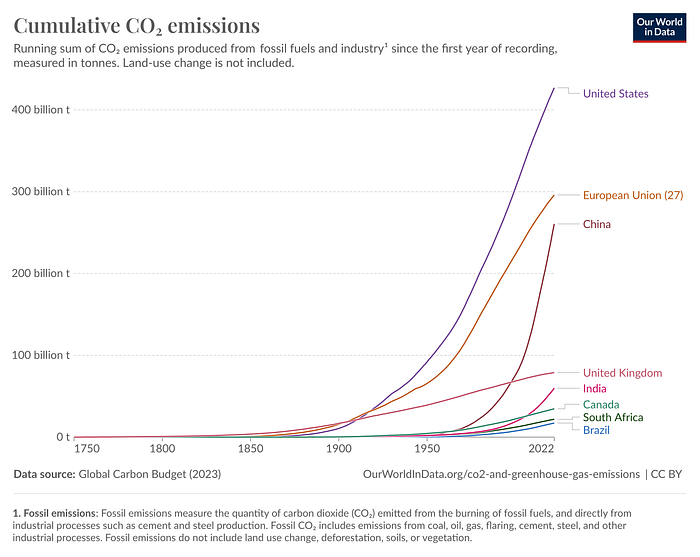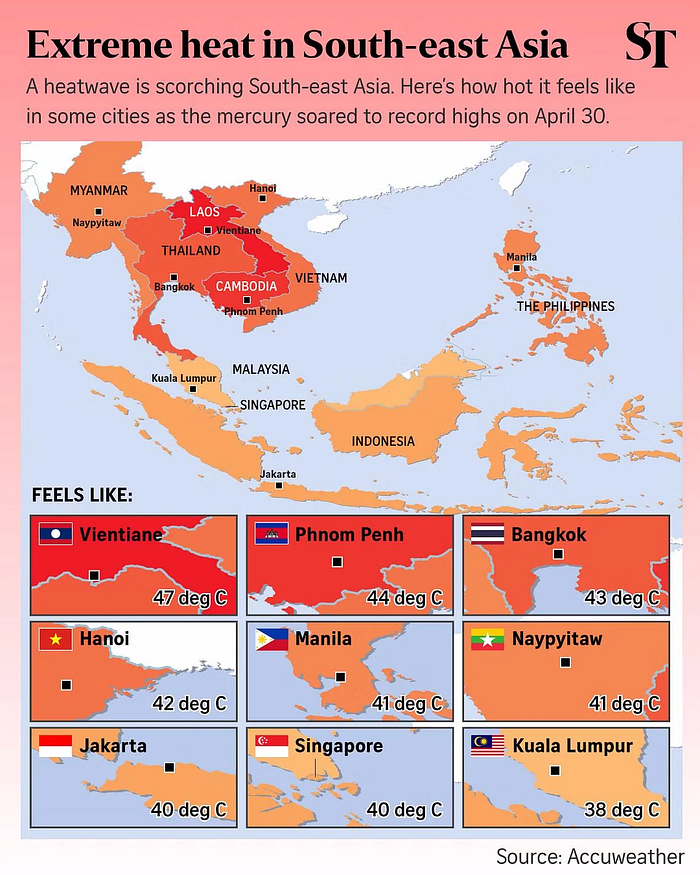Dhaka, the megacity I currently live in, is home to more than 10 million people. Here everyone, including the limited wildlife this city possesses, is witnessing what they've never seen in their lifetime.
Not just the capital Dhaka but the entire country, Bangladesh, is experiencing a heatwave running for 31 days straight. And life here is getting harder and harder for every living being.
As I write this, the outside world is burning with extreme heat coupled with high humidity. If you must go outside for some reason, brace yourself — most likely your head will start spinning within a few minutes as temperatures continuously hover around 40°C.
It's recorded that eleven people have died of heat stroke across the country in the last eight days, and with each passing day, the situation is getting worse.
"The hot spell is impacting more than 50 out of 64 administrative districts and is likely to continue until the first week of May," said meteorologist Khandaker Hafizur Rahman.
Another meteorologist, Muhammad Abul Kalam Mallik said, this is the first time the country has experienced a heatwave of such duration since 1948, when it began recording heatwaves.
Bangladesh is located in the world's largest delta, the Ganges, which makes it vulnerable to extreme weather events. It has been grappling with cyclones, floods, droughts, and riverbank erosion for years. Especially for those living in coastal areas, life has always been an ongoing struggle against the wrath of nature.
But now, human-caused climate change is making life nearly impossible for everyone — whether you live in rural areas or in the city. Although as a country we emit less than 1% of global greenhouse gases, we are among the countries most affected by climate change and global warming.
We are paying a heavy price for the wrongs committed in other industrialized and so-called developed countries.

Take the USA as an example.
It has emitted more CO2 from the burning of fossil fuels than any other country to date. The USA is responsible for 25% of historical emissions, totaling around 400 billion tonnes since 1751. Then there's the European Union (EU), which has emitted a staggering 353 billion tonnes of CO2, ranking it second as a historical contributor at 22%.
There are some culprits in Asia as well. For example, China accounts for 12.7% of global cumulative emissions with more than 200 billion tonnes of CO2, while Russia accounts for 6% with 101 billion tonnes since 1975.
Thanks to the Paris Agreement 2015 most countries are on the same page now to combat climate change (as they vowed to limit global warming to well below 2 degrees). Yet thing's hasn't changed much in the positive direction as anticipated.
The damage has already been done, and countries especially in the global south (e.g., Bangladesh, India, Pakistan, Nepal, the Philippines, Vietnam, etc.) are suffering the most from unprecedented weather events like heatwaves, floods, etc.
Despite being a global leader in climate adaptation, Bangladesh is facing tremendous challenges in dealing with these historic heatwaves. These intense situation is threatening both the public life and the country's economy.
Water crisis has intensified in various areas as the groundwater levels plummeted. Tubewells in different parts of the country have become dysfunctional, leaving people without access to clean drinking water.
According to a report on The Daily Star, road surfaces in several districts have melted due to extreme heat, creating a safety hazard. The demand for energy is skyrocketing and power outages for hours has now become a normal thing.
And the situation is not going to ease anytime soon. As the El Niño weather phenomenon is playing a role this year, the temperatures are likely to be higher on average.

Other countries in Asia is experiencing intense heatwaves. Previous records are being shattered on a regular basis.
- China's Yunnan province recorded the country's highest April temperature at 43.4°C while Hainan province set a new record with temperatures reaching 42.8°C.
- Kolkata is experiencing its longest April heatwave just like Bangladesh, with temperatures hitting significantly above average. Yesterday, the city recorded its hottest day in 70 years as the maximum day temperature touched 43°C.
- Record temperatures were also reported from Japan to Vietnam, including Vietnam's highest April record of 44°C and similar highs in Thailand. Myanmar and Laos also experienced severe heat, with Myanmar temperatures reaching 46°C and Laos setting a national April record at 43.2°C.
World Meteorological Organization (WMO) reported that Asia has been warming faster than the global average, with temperature rises in 2023 averaging nearly 2 degrees Celsius (3.6 degrees Fahrenheit) above the 1961–90 average. The report also found that in 2023, Asia continued to be the region most affected by disasters related to weather, climate, and water hazards.
Understandably, things won't be different throughout 2024 (if not worse) as we're already experiencing such extreme weather events.
It's already late, but world leaders, policymakers, and we — the general public — still have much to do if we want ourselves and future generations to breathe under the sun.
Better late than never, right?
- Countries should take proper actions to implement their Nationally Determined Contributions (NDCs) for reducing greenhouse gas emissions.
- Governments should enact strong policy-level changes to pressure big businesses to adopt greener practices.
- Of course, a significant shift toward clean energy is needed, and energy consumption must be efficient across all sectors.
- Massive reforestation projects should be undertaken to act as carbon sinks.
- Strong adaptation strategies, based on extensive research, should be implemented so that countries can adapt to the unavoidable impacts of climate change, such as rising sea levels and increased weather variability.
On a personal level, every one of us should be mindful of our actions. We should strive to lower our carbon footprint.
No matter how small the contribution may seem (for example, turning off lights, using energy-efficient appliances, and reducing heating and cooling consumption), we should keep in mind that it contributes to a collective effort to mitigate the impacts of global warming.
Nothing is too small when it comes to save this lovely planet.
And remember, if you don't take appropriate actions now, you may encounter what you've never faced in life — perhaps in the form of extreme heatwaves like we're experiencing now or in some other forms like tornadoes, cyclones, hurricanes, floods, or else.
You are not safe, not even in the most high-tech and expensive underground bunker. If you continue to mess with nature and disrupt its balance, you will surely face severe consequences.
Act now!
If you want to read more of my writings, do check out the following articles.

